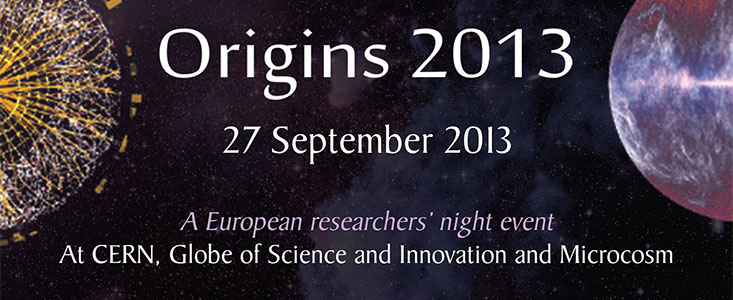Mitteilung
Origins 2013 – Machen Sie mit!
Die wichtigsten europäischen wissenschaftlichen Organisationen beteiligen sich an der Nacht der Forscher
18. September 2013
Das CERN, die ESA, die ESO und die UNESCO laden in Zusammenarbeit mit dem italienischen Institut für Astrophysik (INAF) die Öffentlichkeit dazu ein, an „Origins 2013“ teilzunehmen. Dieses einzigartige Event findet am 27. September 2013 – der europäischen Nacht der Forscher – gleichzeitig in Genf, Paris und Bologna statt. Menschen in aller Welt können das Event live durch Webcasts verfolgen.
Was haben Teilchenphysik, Astrophysik und Weltraumforschung gemeinsam? Sie alle addressieren fundamentale Fragen, die mit unseren Ursprüngen verbunden sind: der Ursprung der Materie, des Universums sowie des Lebens an sich.
In den letzten Monaten wurden am Large Hadron Collider mit der Entdeckung des Higgs-Bosons und mit dem Planck-Satelliten durch die Veröffentlichung des bisher genausten Bildes des frühen Unversiums wichtige wissenschaftliche Durchbrüche erzielt. Außerdem wurde vor kurzem der ALMA-Teleskopverbund in Chile eingeweiht. ALMA ist das derzeit größte astronomische Projekt und wird beispiellose Einblicke in den Kosmos ermöglichen.
Origins 2013 wird diese faszinierenden wissenschaftlichen Unternehmungen präsentieren. Das einzigartige Event hebt die enge Verbindung zwischen den kleinen Dimensionen der Teilchenphysik und den großen der Astrophysik hervor. Forscher beider Gebiete werden ihre Leidenschaft und Einblicke mit der breiten Öffentlichkeit teilen.
Das Publikum beim CERN in Genf, im UNESCO-Hauptsitz in Paris und im Zentrum von Bologna wird auf eine Reise durch Raum und Zeit mitgenommen, um mehr über die Ursprünge des Universums und seine plötzliche räumliche Expansion vor 13,8 Milliarden Jahren zu lernen. An den drei Veranstaltungsorten werden die Besucher Wissenschaftler, die an den wissenschaftlichen Errungenschaften beteiligt waren, in persönlichen Speed-Dating-Diskussionen treffen können.
„Mit Origins 2013 wollen wir die Tausende von Forschern feiern, die durch ihre Arbeit an wissenschaftlichen Instrumenten wie Planck und dem LHC die Menschheit einen Schritt weiter in Richtung Verständnis der Ursprünge des Universums gebracht haben und das heutige Bild seiner Zusammensetzung geschaffen haben“, fasst Sergio Bertolucci, Forschungsdirektor am CERN zusammen. Er wird die Veranstaltung am Freitag, dem 27. September zusammen mit Mark McCaughrean, dem Leiter der Abteilung für Forschung und wissenschaftliche Unterstützung der ESA eröffnen. Sie werden über eine Videokonferenz mit Gretchen Kalonji, der stellvertretenden Generaldirektorin für Naturwissenschaften verbunden sein, die das Event in Paris eröffnet.
Videokonferenzen werden die drei europäischen Städte auch mit dem Kontrollzentrum der Planck-Mission der ESA in Darmstadt, dem ALMA-Observatorium in der Atacamawüste in Chile und dem LHC-Tunnel 100 Meter unter der Erde in der Nähe von Genf in der Schweiz verbinden. Zusätzlich wird wird es eine Liveschaltung zum ESA-Astronauten Luca Parmitano an Bord der Internationalen Raumstation geben.
Reservierungen für das Speed-Dating und den Live-Webcast am CERN müssen über die ORIGINS-Website vorgenommen werden.
Origins 2013 ist ein Projekt, das von CERN geplant und in Zusammenarbeit mit dem INAF, der ESO, der ESA sowie der UNESCO realisiert wurde.
Links
Kontaktinformationen
Lars Lindberg Christensen
ESO education and Public Outreach Department
Garching bei München
Tel: +49-89-3200-6761
Mobil: +49-173-3872-621
E-Mail: lars@eso.org
Über die Mitteilung
| ID: | ann13076 |

